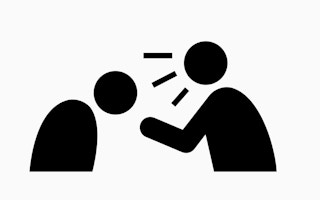A troubling case of workplace bullying in the Singapore office of the world’s largest conservation group has surfaced the reality that organisations set up to do good aren’t necessarily good places to work.
To continue reading, subscribe to Eco‑Business.
There's something for everyone. We offer a range of subscription plans.
- Access our stories and receive our Insights Weekly newsletter with the free EB Member plan.
- Unlock unlimited access to our content and archive with EB Circle.
- Publish your content with EB Premium.
Coralie Ponsinet has alleged that she suffered post-traumatic syndrome — a condition typically associated with soldiers returning from a war zone — from bullying during her time with World Wide Fund for Nature (WWF) Singapore, from July 2015 to February 2017.
In its defence, WWF points to a whistleblowing mechanism that it has in place for people to report bullying. Its Singapore CEO R Raghunathan, who was appointed in April last year after the alleged period, told me that WWF could not comment on individual cases, but had “acted swiftly whenever complaints have been brought to our attention, from commissioning investigations to ensuring disciplinary action where allegations have been substantiated”.
Bullying can happen in any workplace, but experts say that civic society and sustainability-related organisations — including sustainability departments of companies and governments — might be particularly vulnerable to bullying, harassment and other forms of abuse because of their very nature.
People who work for civic society or sustainability organisations are rarely in it for the money. They’re emotionally invested in doing good work for a cause, which leaves them vulnerable to abuse, says a former senior WWF executive, who left the conservation group after his job became untenable because of ongoing bullying around the same time Ponsinet was working there. He declined to be named for privacy reasons.
People in positions of power in organisations perceived to be do-gooding are less likely to be called out for toxic behaviour, and are protected by the idea that they are saviours or heroes, says Animah Kosai, founder of Speak Up Collective, a United Kingdom-based healthy workplace group. “We hold saviours or heroes up, and so we give them more power,” she says.
This is what makes Coralie Ponsinet speaking out all the more laudable. She did so despite risks to her career and her mental health. “Workplace bullying thrives when we targets stay silent and hidden, feeling ashamed and weak,” she wrote in a LinkedIn post last week. One former WWF staffer said he couldn’t speak to me, because he felt sick just thinking about it — and this is six years after his experience of bullying trauma.
“
People are less likely to report toxic behaviour by someone who is seen as a do-gooder.
Animah Kosai, founder, Speak Up Collective
How bullying thrives
People with psychopathic or sociopathic tendencies are drawn to positions of power in work places where people are vulnerable and they can get away with abuse, which is often true of non-governmental organisations (NGOs), says Kosai.
Whistleblowing against bullies in civic society organisations is less likely because of the fear that doing so will hurt well-meaning programmes, says another former senior WWF executive, who worked for the organisation for almost three years until 2016. She also declined to be named.
“There’s weight on the shoulders of anyone who speaks out against an organisation that does good work. That’s why people keep quiet,” she says.
By contrast, people who work for a bank or an insurance company, organisations less inclined to be good corporate citizens, are less hesitant to call out their employers, because their jobs aren’t usually perceived to be as purposeful, she adds.
What to do about bullying?
How do you know when you’re being bullied and what can you do about it? Here’s some advice from Animah Kosai, a former lawyer and founder of workplace wellbeing non-profit, Speak Up Collective:
◉ The moment you feel uncomfortable, anxious or afraid at work, especially of someone or a group of people, you’re probably facing bullying or harassment. You are not too sensitive and it’s not your fault. No one has the right to make you feel humiliated or fearful.
◉ Find allies within your organisation — colleagues who will stand by you, and senior people who will help you take your case forward. In talking to colleagues, you may find they have the same experiences. This makes a big difference.
◉ While human resources should help, you know your organisation best — it can be risky. Besides seeking legal advice, you need emotional support from friends and family. Trauma from bullying is common, and perfectly natural, even if it happened years ago. Don’t be afraid to seek professional help.
◉ If you are bullied at work and it is impacting your mental health, start looking elsewhere. Too many organisations don’t understand workplace bullying and compound the victim’s trauma through processes which focus on legal box ticking, and retributive justice instead of being human centric and sensitive.
◉ With some exceptions (Canada and Australia), most countries don’t have specific workplace bullying laws. Singapore has weak employee and whistleblowing protection laws. Foreigners are more vulnerable — if they lose their jobs, it impacts their ability to stay in the country. Other Asian countries also lack laws that specifically address workplace bullying.
◉ Cause-related organisations should recognise the greater power inbalance and factor in extra safeguards including the ability for bullying victims to report safely. They also need to take a restorative justice approach. HR and leaders need to be trained to respond sensitively in supporting people who report bullying.
A lack of systems in place to police abuse, particularly in smaller organisations that do not have human resources teams or clear policies that address workplace abuses, also leaves the door open to bullying.
Despite WWF’s whistleblowing mechanism, as many as 12 people Eco-Business has spoken to were bullied even with those safeguards in place.
At the root of an organisation that lets bullying thrive is the idea of power distance — that is, the degree to which junior members of a team accept that power is distributed unevenly and the extent to which they accept or challenge the authority of the person in charge. In “high power distance” cultures, lower level staff will always defer to higher-ups, and willingly accept that that is the natural order of things.
A paper by professor Devi Akella of Albany State University suggests that societies ranking high in power distance will be especially prone to workplace bullying. Asian societies rank particularly high for power distance, as do civic society organisations where the bosses are held up as “saviours”.
After speaking to a number of practitioners in Singapore over the past few weeks, it is clear that some high-profile figures get away with workplace bullying because their positions of power go unchallenged for the reasons above.
These people have, according to a well-known sustainability consultant in Singapore, risen to prominence in the NGO scene in traditional, cut-throat environments and have sought to recreate that culture wherever they go, not recognising that sustainability starts with taking care of the people who work for you.
“They are used to working in a certain way, and it’s hard to rewire their ways of thinking,” she says. “We talk so much about collaboration in sustainability, but are hampered by a deeply ingrained ‘power over’ or ‘we need to show them by one-upping others, and we will work the team dry to do that’ attitude.”
Bullying — a business risk
But Kosai says that workplace bullying is prevalent everywhere, and pointing the finger at certain cultures or environments is not helpful in tackling a ubiquitous problem. According to the International Labour Organisation, one in three people globally have been bullied at work.
Workplace bullying is an epidemic that has persisted for as long as work itself, and is the only form of abuse that is not taboo; abusing children, spouses or partners is not tolerated, but workplace bullying has apparently been normalised with bullies skirting the reporting rules to stamp-out dissent.
More than half of bullying cases go unreported, for fear of repercussions, the higher status of the bully, or the belief that bullying is endemic to the workplace and can’t be rooted out, according to data from Workplace Bullying Institute, a US-based support group.
The problem could be getting worse during the Covid-19 pandemic, since staff working remotely are more likely to suffer from bullying than those who go into a physical office. “When Covid began, I thought things would slow down but I was very wrong,” says Linda Crocket, founder of the Canadian Institute of Workplace Bullying and Harassment & Resources.
People working remotely are more isolated and lack the support of colleagues. People’s jobs are more vulnerable in a pandemic too. “When people are insecure about their jobs, they are less likely to rock the boat. Reporting bullying could brand them a troublemaker, and if there are job cuts, they may be the first to go,” says Kosai.
Even pre-Covid, retaliation including termination for reporting bullying and other forms of harassment was very real, she adds.
“
Any organisation that doesn’t look after their employees will suffer the consequences eventually one way or another.
Thomas Milburn, Southeast Asia director, Corporate Citizenship
But at least more people like Coralie Ponsinet are speaking up and reporting workplace bullying, emboldened by movements such as ‘MeToo’ and ‘BlackLivesMatter’, says Kosai. “People are now beginning to realise that the toxic behaviour that has been harming them for years is not acceptable,” she says.
“Older generations describe younger employees as snowflakes or too sensitive. No, I see the younger generation as being far more self-aware and able to draw their boundaries and call out bad behaviour. Workplace bullying has thrived in secret for too long,” says Kosai.
It seems particularly unjust that the organisations that claim to be making the world a better place are harming their own people. Protecting employees should be the first thing any organisation thinks about, not the last, and it is appalling that it has taken a pandemic for the world of work to consider employee wellbeing to be a business risk.
Martina Cheung, president at analytics firm S&P Global Market Intelligence, said at the Ecosperity conference last month that the mental health of employees is a key issue for the ‘S’ in ESG (environmental, social and governance), and could become as important as greenhouse gas emissions are to the ‘E’ in ESG now.
No wonder, then, that the market for corporate wellness — which is the business of protecting employees from the sort of conditions that result from bullying, such as depression, anxiety and high blood pressure — is growing by 7 per cent a year, globally.
Thomas Milburn, Southeast Asia director of Corporate Citizenship, a sustainability consultancy, says that employee wellbeing “isn’t just feel good, do the right thing, stuff.” Looking after employees is a critical success factor for any business, he says.
“Happier and healthier people are more productive. And as the lines of the traditional workplace vanish, people need more flexibility, empowerment and trust. Companies that embrace this will get more out of their people in terms of engagement, loyalty and effort.”
The bottom line is that any organisation that doesn’t look after their employees will suffer the consequences eventually one way or another, says Milburn.
Organisations need to take a closer look at how they’re treating their people — especially those organisations that claim to be driven by “purpose”. If you’re harming your staff, the good work that you do is not really good at all.











